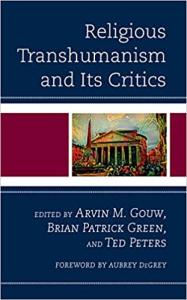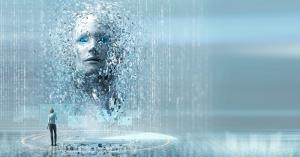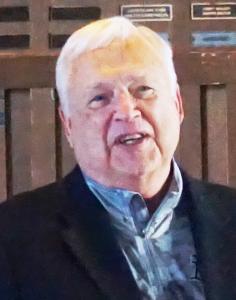Religious Transhumanism?
Jewish Transhumanism? No!
H+ 6 / 1016
Is the bioconservative critique so severe as to preclude religious transhumanism? Even Jewish transhumanism? No one is more eloquent and forceful on the matter of Jewish transhumanism than Hava Tirosh-Samuelson. What follows is a real treat for the reader.
Religious Transhumanism and Its Critics
 It’s arrived! What has arrived? The March 16, 2022 publication of Religious Transhumanism and Its Critics by Roman and Littlefield/Lexington edited by Arvin Gouw, Brian Patrick Green, and Ted Peters.
It’s arrived! What has arrived? The March 16, 2022 publication of Religious Transhumanism and Its Critics by Roman and Littlefield/Lexington edited by Arvin Gouw, Brian Patrick Green, and Ted Peters.
Here in this Patheos series on public theology, we are constructing a scientifically informed vision of humanity’s future in light of God’s eschatological promises for ultimate transformation and renewal. In H+ 1, we asked whether AI could provide a shortcut to virtue or holiness? In H+ 2, we parsed the transhuman, the posthuman, and the truly human. In H+ 3, we distinguished Radical Life Extension, Cybernetic Immortality, and Resurrection of the Body. We asked Micah Redding about Evangelical Transhumanism in H+ 4 and Lincoln Cannon about Mormon Transhumanism in H+ 5. So, now, in H+ 6 we extend the discussion by asking Hava Tirosh-Samuelson at Arizona State University to evaluate transhumanism from a Jewish perspective. What Dr. Triosh-Samuelson says will knock your socks off.
Meet Hava Tirosh-Samuelson
 Hava Tirosh-Samuelson
Hava Tirosh-Samuelson (Ph.D. Hebrew University, 1978) is Regents Professor of History, Irving and Miriam Lowe Professor of Modern Judaism, and Director of Jewish Studies at Arizona State University in Tempe, Arizona. She is the author of the award-winning,
Between Worlds: The Life and Thought of Rabbi David ben Judah Messer Leon (1991);
Happiness in Premodern Judaism: Virtue, Knowledge and Well-Being (2003), and
Religion and Environment: The Case of Judaism (2020). In addition, she is the editor of 8 volumes, including
The Legacy of Hans Jonas: Judaism and the Phenomenon of Life (2008),
Building Better Humans?: Focusing the Debate on Transhumanism (2011); and
Perfecting Human Futures: Transhuman Visions and Technological Imaginations (2016). Tirosh-Samuelson is also the editor-in-chief of the
Library of Contemporary Jewish Philosophers (2013-2018) a set of 21 volumes that features outstanding thinkers.
Tirosh-Samuelson’s research has been supported by grants from the Templeton Foundation and she is a member of the International Society of Science and Religion, the academic advisory board of Zygon: Journal of Religion and Science, and the Advisory Board of Oxford Interfaith Forum.
TP: What is the Jewish vision for the future of the human species? Why is transhumanism such a threat?
HTS. It is difficult to answer your question, since Judaism is an evolving religious tradition that is too diverse and too multifaceted to be generalized about. Even within the normative rabbinic tradition there are
many voices and strands of thought that can be interpreted in variety of ways.
Moreover, the Judaic tradition has encouraged debate and disagreement as a religious posture. So, on any given theme, one could find conflicting views and positions that generate further debates. It is a common joke to say that “if you have two Jews, you have three opinions.”
When I engage
transhumanism from a Judaic perspective, I offer my understanding of the tradition rather than
the Judaic view. I am fully aware that other Jews could offer different perspectives. Some might be more open to the transhumanist vision.
From the rabbinic perspective, the future of the human species depends on the relationship of
humanity with God. That relationship requires observance of Jewish law within the covenantal relationship. Although over the centuries, Jews offered diverse and conflicting interpretation of the Covenant, one thing is clear, divine-human relations presupposed the continued existence of embodied humanity rather than its obsolescence.
The importance of human embodiment is accentuated in the doctrine of the resurrection. The resurrection accompanies the Jewish vision of the Messianic Age (Yemot ha-Mashiah), even though there is no agreement on the what the messianic age will consist of. Affirming the possibility of a better future is very much part of the utopian spirit of Judaism, to be sure. But it remains an aspiration rather than an accomplished reality.
Instead of talking about transhumanism as a “threat” to Judaism, I prefer to explain why I find transhumanism problematic from a Judaic perspective. First, transhumanism aggrandizes the human and aspires to deification of the human. Ideas about the deification of the human could be found in Judaism, going all the way back to antiquity. We find it in the Enochian tradition and in the Jewish mystical tradition. However, most variants of Judaism insist on the transcendence of God and retain the differentiation between the human and God. The human is expected to “imitate God” or be like God, but not “to be God.” For transhumanism, technology will make humans into gods, in contrast. This I find to be a profoundly problematic transhumanist claim.

Second, in a recent publication I discussed transhumanism as techno-idolatry. Idolatry? Yes, precisely because it venerates human-made inventions and the people who create them. Human idolaters have always idolized money, fame, physical prowess, and power, to be sure. Now, they idolize technology. Transhumanism does not simply use technological innovations to improve the human condition . Rather, it considers technology itself to be a force of salvation. Endowing technology with salvific power seems to me to be another evidence for the misguided approach of transhumanism.
Third, because of its valorization of technology, transhumanism considers the biological human but an early and flawed phase of the human species. According to transhumanist futurism, technology will not only “improve” our biology it will transcend our biological condition through mechanization. Here, I find transhumanism to be in sharp contrast with the Judaic outlook that venerates life itself and considers God a living reality. Life means natality, maturation, aging, and mortality. And, these traits of human life are treated as an affront to the transhumanist. The entire transhumanist project is a “crusade against death” which I consider not only sheer hubris, but also a misunderstanding of what it means to be human. There is a dignity in being human. This dignity will get swept away by the transhumanist vision of a future in which humans will cease to be human. Because transhumanists want to see the human species become obsolete, I do not consider the transhumanist vision a viable futurism for humanity.
As I understand it, the Judaic tradition offers a different approach to the future of the human species. First, the remote future is beyond the ken of human knowledge, precisely because humans are not gods. Second, the future is not entirely in human hands, but requires divine involvement or divine-human interaction. And third, life in the present matters more than speculations about a hypothetical remote future. The Judaic vision focuses on the life in the here and now and the ethical demands it poses. For all those reasons, I find transhumanism’s futuristic speculations no more than that, namely, speculations that should be assessed and critiqued by their impact on our life in the present.
TP: What problems do you see in the attempt to enhance humanity in light of a transhumanist vision of perfection through technology? What does it mean, in your judgement, to become perfect?
HTS. There are many issues which are problematic here, some pertain to the concept of
‘enhancement’ and others to the concept of ‘perfection.’ As for enhancement, there is no doubt that various technologies can and already have improved human life in various domains (physical, emotional, and cognitive). We are definitely benefitting from many of these technological developments, and it is reasonable to assume that human life will continue to benefit from new technologies that enable us to understand the functioning of the human body.

However, these developments do not necessarily entail, “perfection.” First, since there is no agreement, nor can there be an agreement, about the meaning of ‘perfection.’ The concept is culturally and socially dependent, so any ideal of ‘perfection’ must be contextualized and historicized. Aristotle told us that all human beings seek to be happy, but even that notion is socially constructed and requires historization.
Second, perfection is a dynamic process that involves intentional effort that endows life with direction and meaning; perfection is not a fixed outcome that can be achieved while one is alive. Rather, perfection is an asymptotic concept that charts a direction but that always fall short.
Third, the technologization of
perfection as envisioned by transhumanism leaves out most aspects of being human (e.g., aspirations, hopes, inspirations, and dreams) which cannot be technologized because they are inherently relational. Relationality cannot be technologized but only experienced, although technology can be involved in various types of relations. The transhumanist promotion of enhancement is based on a particular conception of ‘perfection’ which needs to be unpacked and critiqued.
For me, the pursuit of perfection is always a process fraught with frustration and disappointment rather than linear, causal relations (i.e., if you do x, you become “perfect”). As a relational concept, perfection requires ethical effort, acquisition of virtues and a lot of emotional engagement. The ideal of perfection is an I-thou relation. But such a relation is hard to sustain. An I-Thou relation too quickly turns into I-It. Therefore, seeking perfection remains an aspiration that impacts the quality of our life; but it is always something that we must work on and continue to improve.
While perfection cannot be achieved in this life, whatever ideal we hold about perfections frames our life in the present, especially in terms of human relations. To become “perfect,” therefore, means to be able to sustain I-Thou relations over time while knowing that for temporal human beings such a relationship is never eternal, but always temporary. Transhumanism offers a more static, instrumentalist, and atomistic vision of ‘perfection’ because it thinks about humans as machines (analogous to computers). I believe this is a mistaken interpretation of the meaning of being human.
TP: Transhumanists plan to defeat death either through Radical Life Extension (RLE) in embodied form on Cybernetic Immortality (C) in disembodied form. How do you assess this from a Jewish perspective?
HTS. I find the effort of defeating death through radical life extension or cryonics to be truly misguided and even offensive. To be human is to be temporal, mortal, embodied person. That is the beauty of being human as well as the tragic aspect of being human. Because we are mortal, living life rightly is very important. Our religious and intellectual traditions offer many resources to help us live rightly and Judaism has much to say about it. I find the “crusade against death” or the anti-aging industry to be bizarre if not fraudulent.
Of course, living healthy life is a good goal, but
radical life extension is not a good goal. I do not see how extending human life on Earth, which can barely sustain the number of people already on it, is a good goal. I also do not believe that people will be happier if they lived longer. On the contrary, I think radical life extension will bring us more wars, more conflicts, more boredom, more emptiness, and more shallowness than we already experience.
As for cybernetic immortality via
whole brain emulation--or “practical immortality” as transhumanists call it–I find it conceptually incoherent. Since to be “me” requires a body, my disembodied presence in cyberspace is not me but only a digital representation of me. My digital presence can outlast me, and it will be meaningful to a few who will care about me or about my legacy, but that does not make me immortal. The meaning of human life has to be found in the facts of our mortality rather than in dreams about creating cybernetic immortality. And if by
cybernetic immortality you refer to brain uploading, I maintain it is neither feasible nor coherent, precisely because the “me” that will be presumably uploaded on a superintelligent machine, will not be “me.”
TP: Any final worlds?

HTS. Transhumanist ideas have already influenced many aspect of contemporary culture, shaping the debate on technology. The debate is important because it leads us to think about the meaning of being human. I maintain that we need to take transhumanism seriously and critically and put the focus on so much on the feasibility of certain ideas, but on the social impact of transhumanist imagination in the present. Transhumanism is promoted by tech-entrepreneurs who have profound influence on our life and eventually they, more than critics of transhumanism, will shape the future of our society.
I, for one, consider that prospect quite frightening rather than liberating. I should also say that futurism is a risky business. Most futuristic scenarios fail to come about and we never challenge the prognosticator after his/her vision has been proven false. Some people are more prone to futuristic thinking than others, but I am not attracted to this mode of thinking. Perhaps this is because I am an intellectual historian and find that inquiry about the past is much more productive for human life than speculations about the remote future. However, some people might consider this as a lack of imagination or refusal to entertain alternative possibilities. Be this as it may, interest in futurism, I believe, is a matter of taste or predilection.
Conclusion
Jewish Transhumanism? Not on your life.
Hava Tirosh-Samuelson will protect your and my
human dignity as we are today: imperfect, struggling, still on-the-way to becoming something better. Transhumanism’s pressure to become posthuman through technological transformation de-dignifies us and risks idolatry. This is a forceful critique.
▓
 Ted Peters directs traffic at the intersection of science, religion, and ethics. Peters is an emeritus professor at the Graduate Theological Union, where he co-edits the journal, Theology and Science, on behalf of the Center for Theology and the Natural Sciences, in Berkeley, California, USA. He authored Playing God? Genetic Determinism and Human Freedom? (Routledge, 2nd ed., 2002) as well as Science, Theology, and Ethics (Ashgate 2003). He is editor of AI and IA: Utopia or Extinction? (ATF 2019). Along with Arvin Gouw and Brian Patrick Green, he co-edited the new book, Religious Transhumanism and Its Critics hot off the press (Roman and Littlefield/Lexington, 2022). Soon he will publish The Voice of Christian Public Theology (ATF 2022). See his website: TedsTimelyTake.com.
Ted Peters directs traffic at the intersection of science, religion, and ethics. Peters is an emeritus professor at the Graduate Theological Union, where he co-edits the journal, Theology and Science, on behalf of the Center for Theology and the Natural Sciences, in Berkeley, California, USA. He authored Playing God? Genetic Determinism and Human Freedom? (Routledge, 2nd ed., 2002) as well as Science, Theology, and Ethics (Ashgate 2003). He is editor of AI and IA: Utopia or Extinction? (ATF 2019). Along with Arvin Gouw and Brian Patrick Green, he co-edited the new book, Religious Transhumanism and Its Critics hot off the press (Roman and Littlefield/Lexington, 2022). Soon he will publish The Voice of Christian Public Theology (ATF 2022). See his website: TedsTimelyTake.com.
▓
 Oxford’s Nick Bostrom does not want religious transhumanism (H+). He wants transhumanism to replace religion.
Oxford’s Nick Bostrom does not want religious transhumanism (H+). He wants transhumanism to replace religion. It’s arrived! What has arrived? The March 16, 2022 publication of Religious Transhumanism and Its Critics by Roman and Littlefield/Lexington edited by Arvin Gouw, Brian Patrick Green, and Ted Peters.
It’s arrived! What has arrived? The March 16, 2022 publication of Religious Transhumanism and Its Critics by Roman and Littlefield/Lexington edited by Arvin Gouw, Brian Patrick Green, and Ted Peters. Hava Tirosh-Samuelson (Ph.D. Hebrew University, 1978) is Regents Professor of History, Irving and Miriam Lowe Professor of Modern Judaism, and Director of Jewish Studies at Arizona State University in Tempe, Arizona. She is the author of the award-winning, Between Worlds: The Life and Thought of Rabbi David ben Judah Messer Leon (1991); Happiness in Premodern Judaism: Virtue, Knowledge and Well-Being (2003), and Religion and Environment: The Case of Judaism (2020). In addition, she is the editor of 8 volumes, including The Legacy of Hans Jonas: Judaism and the Phenomenon of Life (2008), Building Better Humans?: Focusing the Debate on Transhumanism (2011); and Perfecting Human Futures: Transhuman Visions and Technological Imaginations (2016). Tirosh-Samuelson is also the editor-in-chief of the Library of Contemporary Jewish Philosophers (2013-2018) a set of 21 volumes that features outstanding thinkers.
Hava Tirosh-Samuelson (Ph.D. Hebrew University, 1978) is Regents Professor of History, Irving and Miriam Lowe Professor of Modern Judaism, and Director of Jewish Studies at Arizona State University in Tempe, Arizona. She is the author of the award-winning, Between Worlds: The Life and Thought of Rabbi David ben Judah Messer Leon (1991); Happiness in Premodern Judaism: Virtue, Knowledge and Well-Being (2003), and Religion and Environment: The Case of Judaism (2020). In addition, she is the editor of 8 volumes, including The Legacy of Hans Jonas: Judaism and the Phenomenon of Life (2008), Building Better Humans?: Focusing the Debate on Transhumanism (2011); and Perfecting Human Futures: Transhuman Visions and Technological Imaginations (2016). Tirosh-Samuelson is also the editor-in-chief of the Library of Contemporary Jewish Philosophers (2013-2018) a set of 21 volumes that features outstanding thinkers. Second, in a recent publication I discussed transhumanism as techno-idolatry. Idolatry? Yes, precisely because it venerates human-made inventions and the people who create them. Human idolaters have always idolized money, fame, physical prowess, and power, to be sure. Now, they idolize technology. Transhumanism does not simply use technological innovations to improve the human condition . Rather, it considers technology itself to be a force of salvation. Endowing technology with salvific power seems to me to be another evidence for the misguided approach of transhumanism.
Second, in a recent publication I discussed transhumanism as techno-idolatry. Idolatry? Yes, precisely because it venerates human-made inventions and the people who create them. Human idolaters have always idolized money, fame, physical prowess, and power, to be sure. Now, they idolize technology. Transhumanism does not simply use technological innovations to improve the human condition . Rather, it considers technology itself to be a force of salvation. Endowing technology with salvific power seems to me to be another evidence for the misguided approach of transhumanism. However, these developments do not necessarily entail, “perfection.” First, since there is no agreement, nor can there be an agreement, about the meaning of ‘perfection.’ The concept is culturally and socially dependent, so any ideal of ‘perfection’ must be contextualized and historicized. Aristotle told us that all human beings seek to be happy, but even that notion is socially constructed and requires historization.
However, these developments do not necessarily entail, “perfection.” First, since there is no agreement, nor can there be an agreement, about the meaning of ‘perfection.’ The concept is culturally and socially dependent, so any ideal of ‘perfection’ must be contextualized and historicized. Aristotle told us that all human beings seek to be happy, but even that notion is socially constructed and requires historization. HTS. Transhumanist ideas have already influenced many aspect of contemporary culture, shaping the debate on technology. The debate is important because it leads us to think about the meaning of being human. I maintain that we need to take transhumanism seriously and critically and put the focus on so much on the feasibility of certain ideas, but on the social impact of transhumanist imagination in the present. Transhumanism is promoted by tech-entrepreneurs who have profound influence on our life and eventually they, more than critics of transhumanism, will shape the future of our society.
HTS. Transhumanist ideas have already influenced many aspect of contemporary culture, shaping the debate on technology. The debate is important because it leads us to think about the meaning of being human. I maintain that we need to take transhumanism seriously and critically and put the focus on so much on the feasibility of certain ideas, but on the social impact of transhumanist imagination in the present. Transhumanism is promoted by tech-entrepreneurs who have profound influence on our life and eventually they, more than critics of transhumanism, will shape the future of our society. Ted Peters directs traffic at the intersection of science, religion, and ethics. Peters is an emeritus professor at the Graduate Theological Union, where he co-edits the journal, Theology and Science, on behalf of the Center for Theology and the Natural Sciences, in Berkeley, California, USA. He authored Playing God? Genetic Determinism and Human Freedom? (Routledge, 2nd ed., 2002) as well as Science, Theology, and Ethics (Ashgate 2003). He is editor of AI and IA: Utopia or Extinction? (ATF 2019). Along with Arvin Gouw and Brian Patrick Green, he co-edited the new book, Religious Transhumanism and Its Critics hot off the press (Roman and Littlefield/Lexington, 2022). Soon he will publish The Voice of Christian Public Theology (ATF 2022). See his website: TedsTimelyTake.com.
Ted Peters directs traffic at the intersection of science, religion, and ethics. Peters is an emeritus professor at the Graduate Theological Union, where he co-edits the journal, Theology and Science, on behalf of the Center for Theology and the Natural Sciences, in Berkeley, California, USA. He authored Playing God? Genetic Determinism and Human Freedom? (Routledge, 2nd ed., 2002) as well as Science, Theology, and Ethics (Ashgate 2003). He is editor of AI and IA: Utopia or Extinction? (ATF 2019). Along with Arvin Gouw and Brian Patrick Green, he co-edited the new book, Religious Transhumanism and Its Critics hot off the press (Roman and Littlefield/Lexington, 2022). Soon he will publish The Voice of Christian Public Theology (ATF 2022). See his website: TedsTimelyTake.com.













